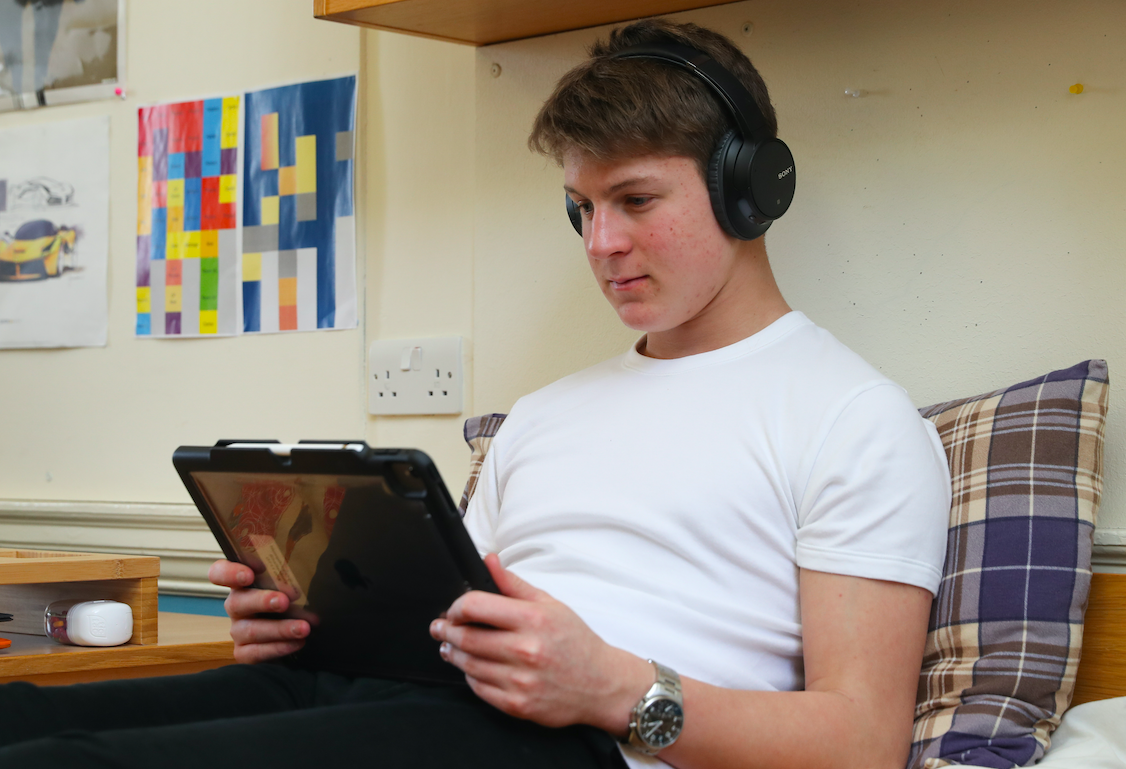My view on ChatGPT: Should schools ban the use of it or explore teaching with it?
In our latest blog post, Assistant Head (Teaching and Learning) Will Bridges shares his view on the innovation of ChatGP...
Read MoreHead of Pastoral Preetpal Bachra reflects on the impact of last week’s school closure and suggests ways in which to engage and connect with your children whilst they are virtually learning at home.

Mr Hardy had broken with convention and opened the A2 social on Wednesday and did so again on Thursday night. Both he and the Headmaster served behind the bar and spent time, like a number of staff, with the pupils. I walked up towards some of the Houses with a number of A2 pupils after closing time on Thursday. The overwhelming sense of sadness was both palpable and visible. There is personal uncertainty; what grades could they have achieved? What about post-applications? What about the years of work that many had put in to preparing for the ultimate measure of secondary education? We, as parents, worry about that too. However, there was a sense amongst the A2 pupils that ‘this might be it’ (for the record, I am retaining my optimism and believe that with the teaching and education continuing, there will be another chance for us all to be together). So, there was grief for the loss of time to reflect and celebrate, to cement those strong connections that exist and to have a final shared sense of space and experience. This loss was evident as I walked with them. The same is true for those B pupils moving to pastures new next year. There will be opportunities to connect but, on Thursday night, it was hard for some of the pupils to see that.
Nearly all pupils have left the school site now, but we have still been able to enjoy time with those here. Serena C has taught me the card game Cabo in the Café, and 1st XI star Tom S enjoyed a cricket net with three members of staff, though found Mr Bray too hot to handle. However, having pupils at home, without Bryanston’s amazing facilities, may present a broad range of challenges for parents and so perhaps the following three pieces of advice might be of use.
1.Listen to the experiences of the pupils
As adults, we also fear that this sadness in the pupils may be supplemented by the lived experience of coronavirus COVID-19. Their world of personal uncertainty is likely to feel the additional burden of local and national uncertainty in the coming weeks and this is a dramatic change to the usually safe and structured world of a teenager at Bryanston. So, my first piece of advice would be to try and see things from the perspective of our children and to acknowledge their feelings. This doesn’t mean we allow them to do what they want but listening is always a good starting point with teenagers. We need to see things from their side. Getting teenagers to talk and then listening to them is no easy feat.
2. Encourage pupils to lead on what they need to do
A further challenge of having children home for prolonged periods of time is the difference between our perceptions and theirs. Many of us can relate to the viral video of options for self-isolation with family but this may become a necessity. We will be happier if we can find a way to enjoy it or at least make it work whilst also acknowledging concerns for our own working lives as well as the global future. The School is working hard to establish the frameworks for teaching in this new virtual environment and, actually, it is exciting to learn and implement.
 If you have worries about the burden you will have to bear in terms of making children get on with work, my second tip would be to encourage your children to draw up plans of work for what they need to do and have them share these plans and the resources provided with you. You can discuss how these plans are progressing but let them lead and ask questions rather than give instructions. There is always the temptation to set boundaries based on your own view of working but, if pupils can understand that they have some control, then autonomy can be powerful, or at least Daniel Pink has contended as such. This can be difficult as a parent as a) some children can present as being averse to academia and b) we don’t want them to fail and if that means dragging them over the line, then so be it. However, some parents will have children working exceptionally hard because uncertainty can bring anxiety and poring over books feels like the antidote. In either case, if they lead and we ask to understand what and why they are doing things, then this can lead them to reflection and improvement.
If you have worries about the burden you will have to bear in terms of making children get on with work, my second tip would be to encourage your children to draw up plans of work for what they need to do and have them share these plans and the resources provided with you. You can discuss how these plans are progressing but let them lead and ask questions rather than give instructions. There is always the temptation to set boundaries based on your own view of working but, if pupils can understand that they have some control, then autonomy can be powerful, or at least Daniel Pink has contended as such. This can be difficult as a parent as a) some children can present as being averse to academia and b) we don’t want them to fail and if that means dragging them over the line, then so be it. However, some parents will have children working exceptionally hard because uncertainty can bring anxiety and poring over books feels like the antidote. In either case, if they lead and we ask to understand what and why they are doing things, then this can lead them to reflection and improvement.
3. Be willing to open up to their world
My final piece of advice is to try and at least sample what the teenage world feels like. I can sense some of you reading this thinking, “whenever I ask to do things together, the answer is interpretable as a firm no” but perhaps we need to change the way in which we approach our children.

My view of having a puppy in the family (I was outvoted 3–1 last summer) changed dramatically when a friend sent me a quote which I think is attributed to Edward Hoagland: “In order to really enjoy a dog, one doesn't merely try to train him to be semi-human. The point of it is to open oneself to the possibility of becoming partly a dog.” I am starting to enjoy the Labradoodle, ridiculously named Kohli, and am trying to replicate her abounding joy at receiving visitors. I am work in progress.
Our children inhabit a world of communication, music, thinking and engagement that we do not necessarily understand and so rather than frown upon it, we should encourage them to share it with us by being interested – open ourselves up to becoming partly a child as it were. That may well take you out of your comfort zones in performing your version of ‘Renegade’ on Tik Tok but, if approached in the right way, your children may love sharing things with you including schoolwork.
As for me, this weekend was spent holding some boxing pads and hearing what foot defence is in boxing then later being shown how to sketch a human head from a photograph by my 15-year-old. I was also taught a ‘finesse finish’ on FIFA 20 on the PlayStation as well as having both iambic pentameter and heroic couplet explained by a 13-year-old (thank you, Mr Kelly). Of course, this positivity will be an increasing challenge for us all in the coming weeks as we juggle remote working with engaging with potentially frustrated and bored teenagers but, as promised, I will try to ‘wag my tail’ every time one of the family comes in the room.
There will be plenty of communication from Bryanston in the coming days but as well as all pupils, we are sending our thoughts out to parents too.